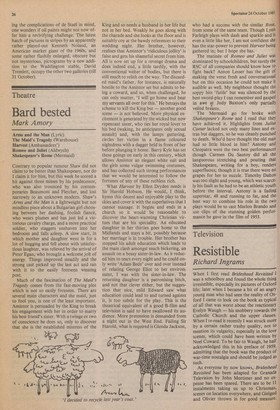Theatre
Bard bested
Mark Amory
Arms and the Man (Lyric) The Maid's Tragedy (Warehouse) Harvest (Ambassadors') Romeo and Juliet (Aldwych) Shakespeare's Rome (Mermaid) Contrary to popular rumour Shaw did not claim to be better than Shakespeare, nor do I claim it for him, but this week he scored a hit against three misses by his predecessor, who was also trounced by his contemporaries Beaumont and Fletcher, and lost narrowly to an unknown modern. Shaw's Arms and the Man is a lightweight but not mindless piece about a Bulgarian girl choosing between her dashing, foolish fiance, who wears plumes and has just led a victorious cavalry charge, and a more practical soldier, who staggers unshaven into her bedroom and falls asleep. A slow start, in which mother and daughter went in for a lot of hugging and fell about with uninfectious laughter, was relieved by the arrival of Peter Egan, who brought a welcome jolt of energy. Things improved steadily and the strong cast picked up the last act and ran with it to the easily foreseen winning post.
Much of the fascination of The Maid's Tragedy comes from the fast-moving plot which is not so easily foreseen. There are several main characters and the maid, just to fool you, is one of the least important. Amintor is persuaded by the King to break his engagement with her in order to marry his best friend's sister. With a twinge or two of conscience he does so, only to discover that she is the established mistress of the King and so needs a husband in her life but not in her bed. Weakly he goes along with the charade and she looks at the floor and is suitably coy at the bawdy references to their wedding night. Her brother, however, realises that Amintor's 'ridiculous jollity' is false and gets his shameful secret from him. All is now set up for a revenge drama and does indeed end, a little tardily, with the conventional welter of bodies, but there is still much to relish on the way. The discarded maid's father, for instance, is naturally hostile to the Amintor set but admits to being a coward, and so, when challenged, he can only mutter, 'I will go home and beat my servants all over for this.' He betrays the scheme to kill the King but — another good scene — is not believed. More physical excitement is generated by the wicked but now repentant sister, who ties her royal lover to his bed (waking, he anticipates only sexual assault) and, with the lamps guttering, circles her victim in a flame coloured nightdress with a dagger held in front of her before plunging it home. Barry Kyle has set these goings on early in this century, which allows Amintor an elegant white suit and the girls some vulgar swimming costumes, and has collected such strong performances that we would be interested to follow the fortunes of any of these ruthless rich.
What Harvest by Ellen Dryden needs is Sir Harold Hobson. He would, I think, hymn this decent and enjoyable play to the skies and cover it with the superlatives that I cannot manage. It begins and ends in a church so it would be reasonable to discover the heart-warming Christian virtues that are his speciality. An educated daughter in her thirties goes home to the Midlands and stays a bit, possibly because her marriage is in trouble. Her brother has stopped his adult education which leads to the main clash amongst much bickering, an assault on a bossy sister-in-law. As it reduced him to tears every night and he could only write 'Adam Bede' over and over instead of relating George Eliot to her environment, I was with the sister-in-law. The returning daughter is a patronising bitch, and not that clever either, but the suggestion that nice, mild Edward saw what education could lead to and turned against it, is too subtle for the play. This is the theatrical equivalent of a good B-film and television is said to have swallowed its audience. More pretension is demanded from a night out in the West End. Failing Sir Harold, what is required is Glenda Jackson, who had a success with the similar Rose, from some of the same team. Though Lynn Farleigh plays with dash and sparkle and is even a little like her, I am not confident she has the star-power to prevent Harvest being gathered in; but I hope she has.
The matinee of Romeo and Juliet was dominated by schoolchildren, but surely the RSC of all companies should know how to fight back? Anton Lesser has the gift of making the verse fresh and conversational but on this occasion he could not make it audible as well. My neighbour thought the soppy bits futile' but was silenced by the best sword-play I can remember and gasped in awe at Judy Buxton's only partially veiled breasts.
The Mermaid go for broke with Shakespeare's Rome and I read that they have achieved it. Highlights from Julius Caesar lacked not only many lines and extras but daggers, so he was cleanly punched to death. Who'd have thought the old man had so little blood in him? Antony and Cleopatra were the two best performances though Carmen Du Sautoy did all the languorous stretching and pouting that Shakespeare, writing for a boy, renders superfluous; though it is true there were nn grapes for her to nuzzle. Timothy Dalton was too slight and young, which was scarcely his fault as he had to be an athletic youth before the interval. Antony is a fading superstar, 48 and running to fat, and the best way to combine his role in the two plays would be to cast Marlon Brando and use clips of the stunning golden performance he gave in the film of 1953.


































 Previous page
Previous page